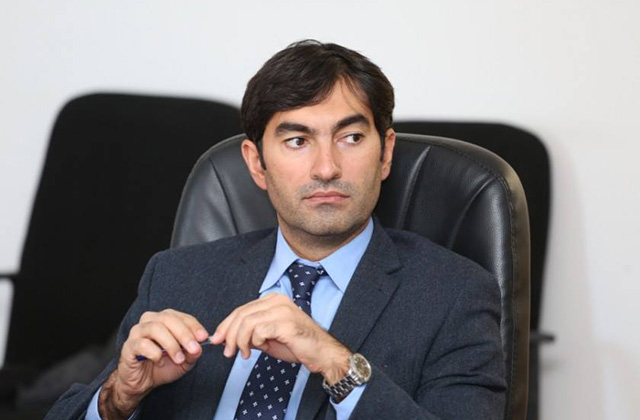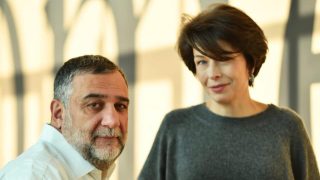Artur Atanesyan: We should finally ask ourselves: what do we want—with melancholy look to the history passing by, or become its direct, reasonable and active participant?

Interview with Artur Atanesyan, head of Yerevan State University Applied Sociology Faculty.
Mr. Atanesyan, these days the activities of “Sasna Tsrer” group established a new situation in the country, which obliges making in-depth analysis of the reasons, which led to the existent situation. In your opinion, which internal and external reasons led to the choice of this critical way of solving the issue?
On the one hand, activity of “Sasna Tsrer” group is extrmity, which the group members don’t hide either, and wider layers of the society supporting them perfectly realize that. On the other hand, extremism is one of the forms of rebellion manifestation, which are applied in case of impossibility of peaceful and constructive activity or unproductivity. Today the mentioned developments are another reason for Armenia’s authorities to prove that country’s rooted socio-economic and political issues are possible to solve through a way beneficial to the nation, moreover, rather quickly. Unfortunately, throughout these days listening to legal, moral and other reassurances by the authorities, as well as different experts and “experts,” we don’t observe concrete steps directed not to “Sasna Tsrer” and population expressing their political discontent, but the numerous issues, around which the existent situation has developed, and solution to which is a vital importance for all of us.
What solution do you observe? Which lessons should the authorities learn?
Of course, it’s easier giving advice, rather than acting and solving real problems. However, upon my subjective perception the situation may change by the authorities, to whom country’s citizens apply with their requests and demands. It would be useful to,
1.Develop joint working group from representatives of departments within RA Government, to which claims of the population are directed regarding socio-economic, demographic and other issues, gathered for years. The commission should involve representatives from “Sasna Tsrer” group and other civic initiatives, as a real opposition, with their project proposals.
2.The working group should come to an agreement and publish the list of main issues, settlement of which will considerably improve Armenia’s place and role in the region with economic and other measurements. The activity of the working group should be elucidated through mass media.
3.Within clear deadlines the working group should develop and submit for the expertise of scientific and analytical organizations of Armenia an action package directed to settlement of the mentioned issues. Activities should be realistic, non-politicized and enshrine national interests.
4.Programs developed by the working group, as well as expert programs, developed by other research organizations, should be assigned to respective executive organizations to implement them. Implementation of the programs should be realized within clear terms and should suppose direct accountancy on the results before the society.
In the period of these 12 days which way are the processes developing? In your opinion, has the solution become visible or did we more approach to a deadlock?
Regime change is the target of “Sasna Tsrer” group, and throughout these days the activities of the authorities are targeted at neutralization of the group. Meanwhile, purpose of both sides should have been and still remains the chain of rooted socio-economic issues, which are the reason for migration, and which have been repeatedly raised by the society. In fact, the leader, which our country needs, is not the one, who is entitled to settle national issues upon the position, and not the citizens, who are repeatedly busy criticizing everyone, but are the people, who, repeatedly, in their everyday work provide settlement, regulation, development and security of the field, trusted to him/her at least in small issues.
What’s your assessment to international reflection of seized police patrol regiment? What conclusions should the Armenian side draw from that reflection?
International reflection generates from the interests and policy led by those states, meanwhile our own reflections and lessons learned are of primary importance. What lessons do we learn from our mistakes? Firstly, we should learn to accept our mistakes and not introduce our defeats as ‘moral victories.’ We need to learn not to cheat, not to possess what, being public, may be helpful to us all. We need to learn speaking with one another not from the positions of self-esteem, but from that of justice.
Mr. Atanesyan, in your opinion, to what may non-equivalent perception of the developments, realities lead in Armenia-Russia relations, on which the Armenian society already has some reservations? It’s becoming clear from Moscow’s official reflections, that the developments are simply wrongly assessed or are used against the West.
We are the only ally of ourselves in this world. Thus, by passing settlement of our own issues to others, or trusting to others, we don’t trust ourselves, and show that we can’t or don’t want to solve our own issues. Accordingly, others, even the ally, may use our shortcomings against us. We should ask to ourselves what do we want—always be melancholic and look to the history passing by or become its direct, reasonable and active participant?
By Araks Martirosyan

























